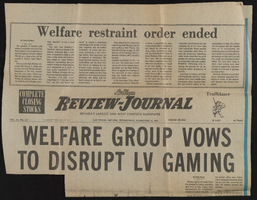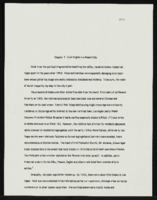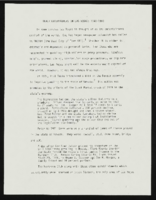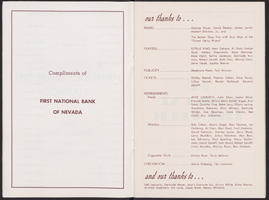Search the Special Collections and Archives Portal
Search Results

Transcript of interview with Marian Beltran Decaro by Frank Murillo, March 27, 1977
Date
Archival Collection
Description
On March 27, 1977, Frank Murillo interviewed housewife Marian Beltran Decaro (born September 7th, 1914 in Flagstaff, Arizona) in her home in Las Vegas, Nevada. This interview covers the history of Las Vegas, Nevada’s first Mexican restaurant. Mr. Decaro is also present during the interview. Additionally, Mrs. Decaro recalls the first atomic bomb test in Las Vegas and also offers an overview of the growth of the area, overall, including the development and demographic details of such distinct historical communities as the Westside.
Text

Herman Jimerson, Ruth Jimerson-Carter, and Leon Carter Jr. oral history interview: transcript
Date
Archival Collection
Description
Herman Jimerson and his younger sister Ruth Jimerson-Carter, along with her husband Leon Carter Jr., gathered on March 3, 2021, to talk about their memories and experiences growing up in West Las Vegas—the Westside.
OH-03746 contains additional interviews with the Carter family that are not transcribed in this document. Contact special.collections@unlv.edu for more information.
Text


"Chapter 7: Civil Rights in a Resort City": manuscript by Roosevelt Fitzgerald
Date
Archival Collection
Description
From the Roosevelt Fitzgerald Professional Papers (MS-01082) -- Unpublished manuscripts file. Pages 274 -313 of unknown manuscript.
Text

"Black Entertainers in Las Vegas in the Era of Segregation 1940-1960": manuscript draft by Roosevelt Fitzgerald
Date
Archival Collection
Description
From the Roosevelt Fitzgerald Professional Papers (MS-01082) -- Unpublished manuscripts file.
Text
Ffolliott "Fluff" LeCoque Papers
Identifier
Abstract
Collection is comprised of Ffolliott "Fluff" LeCoque's professional and personal papers (1879-2015), documenting her life and career working as a dancer and later as company manager for Las Vegas entertainment productions; most notably the long-running Jubilee! show produced by Donn Arden for the MGM Grand and Bally's Hotel-Casinos. Materials include personal letters, drawings, professional papers, newspaper clippings, photographs, magazines, commericially produced sheet music, and related ephemera.
Archival Collection

"A Brief Look of the Development of the Black Community of Las Vegas": manuscript draft by Roosevelt Fitzgerald
Date
Archival Collection
Description
From the Roosevelt Fitzgerald Professional Papers (MS-01082) -- Unpublished manuscripts file.
Text
Transcript of interview with Hank Greenspun by Tony Bleeker, 1975
Date
Archival Collection
Description
Brief interview with Hank Greenspun by student Tony Bleeker. Greenspun speaks about changes in southern Nevada over the years, including politics, gaming and the economy. He mentions the role of the newspaper industry to provide "balance" in society.
No release form is on file for this interview. The interview is accessible onsite only, and researchers must seek permission from the interviewee or heirs for quotation, reproduction, or publication. Please contact special.collections@unlv.edu for further information.
Text
Irwin and Susan Molasky Papers
Identifier
Abstract
The Irwin and Susan Molasky Papers (early 1900s-2012, bulk 1970-2012) primarily contain materials related to real estate development work by Irwin Molasky with his company, the Molasky Group of Companies, in Las Vegas, Nevada. In addition, the collection includes personal photographs (early 1900s-2011, bulk 1970-2011) of family members, friends, and events, as well as a Proclamation from Clark County, Nevada to establish the Molasky Family Park.
Archival Collection

